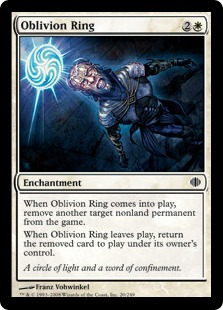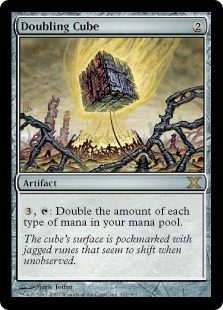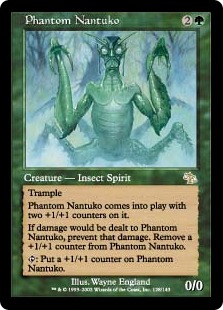
BOOMER!
or, Welcome to Nineteen-- I mean Two-Thousand-and-Nine
By Eli Shiffrin, Brian Paskoff, and Aaron Stevenson
or, Welcome to Nineteen-- I mean Two-Thousand-and-Nine
By Eli Shiffrin, Brian Paskoff, and Aaron Stevenson
Greetings once more, faithful readers, and welcome to 2009! The holidays sure are throwing my schedule off, what with all of the holidays and the traveling and the vacation time that has to be used before it expires, but at least I've had plenty of time to answer your questions!
A little too much time, actually. In between your questions, I've been practicing writing "2009" so I can get used to it, and I'm almost out of space on my walls. Do me a favor and send your questions to [EMAIL="cranial.insertion@gmail.com"]cranial.insertion@gmail.com[/EMAIL] before I have to start in on the ceiling!
Q: If a permanent has vanishing X and vanishing Y, where X < Y, does it come into play with X+Y time counters, X time counters, or Y time counters?
A: It isn't currently possible for a permanent to come into play with two instances of vanishing. If you could, both abilities would place the appropriate number of counters on it, so it would have X+Y counters. It is possible for a permanent to gain multiple instances of vanishing after it's in play. Each vanishing ability will trigger at the beginning of each upkeep, so one counter will be removed for each instance of vanishing the permanent has.
Q: My question involves Waves of Aggression and Wort, the Raidmother. How does the conspire ability work on Waves? Will I get two additional combat phases? Also, can I play Waves for the retrace cost from my graveyard and conspire the retraced spell?
A: That works out very well for your horde of attacking creatures. Each copy of Waves of Aggression will insert another combat phase and main phase into your turn, as long as it's during a main phase when it resolves. A retraced spell is played, so you can pay its conspire cost when you play it. This is a great way to take out a lot of excessive rage on your opponent, who probably deserves it anyway.
Q: I control a Mountain, a Reflecting Pool, and a tapped Boseiju, Who Shelters All. Can I tap my Reflecting Pool for the type of mana that Boseiju would give me so that I can play a Pyroclasm that my opponent can't counter?
A: The additional benefit you get from spending your Boseiju mana aren't part of its "type," so the Pool won't replicate that. The type of mana produced by Boseiju is colorless, so you can play Pyroclasm, but your opponent can still counter it.
Q: My opponents has Lim-Dul the Necromancer in play. I have two Sakura-Tribe Elders in play. If Damnation is played, can I prevent him from getting my Elders?
A: Not really. When the creatures leave play, the game looks back to just before that event to see if anything triggers. At that point, Lim-Dul was in play, so he'll trigger for each of your creatures, and he'll be able to reanimate them. You could respond to Damnation by sacrificing the Elders, but he'll still get the opportunity to take them before Damnation resolves. You can't stop the Necromancer!

If an Oblivion Ring is alone with a
Forest, does it still look round?
Forest, does it still look round?
A: Oblivion Ring can never remove itself; its ability specifies another target nonland permanent, which means something other than the O-Ring. In that situation, the ability just won't do anything.
Q: I attack with my Phyrexian Negator; then after my opponent blocks and damage is on the stack, I sacrifice my Negator to Claws of Gix. Do I still have to sac any permanents for the Negator?
A: Negative. The Negator isn't in play when combat damage resolves, so the damage assigned to it isn't dealt. Also, the ability can't trigger if the Negator isn't in play. As long as you off him before he takes damage, your permanents are safe.
Q: I control a Skittering Skirge. If I bring a creature into play through Exhume or Unearth, will I have to sacrifice my Skirge?
A: No, neither of those things is playing a creature spell. You've played a spell when you've put it on the stack, paid costs, and performed the rest of 409.1. Some other effect might put a creature into play, but that's not the same thing as playing a creature spell.
Q: Can I Lash Out a planeswalker?
A: It depends what you mean. You can't target a planeswalker with Lash Out, because that card targets creatures, which a planeswalker is not. If you win the clash, you'll have 3 noncombat damage headed toward your opponent, and you can redirect that damage to a planeswalker he controls.
Q: In a two-headed giant tournament, what happens if a player plays Dragonstorm with a storm count of 2 and fetches 3 Kokusho, the Evening Star?
A: Death. Lots of death.
If you want to know exactly how that death is dished out, it breaks down like this: Each copy of Dragonstorm resolves individually. As soon as the second Kokusho is in play, they die to the legend rule. Then their triggered abilities cause the opposing team to lose a total of 20 life (5 life per opponent, per Kokusho adds up quickly,) and Team Black Dragon gains 20. Finally, the last Dragonstorm puts a winged 5/5 bundle of death into play.
I hope that death is for your opponents.
Q: Can I enchant an Empyrial Archangel with an Animate Dead?
A: Yes, you can. The Archangel's shroud doesn't apply while it's in the graveyard. When the Archangel is returned to play, you'll attach Animate Dead to it. That doesn't target the Archangel, so the shroud ability won't stop that from happening either.
Q: I control Forbidden Orchard, Tainted Aether, and Engineered Plague set to Spirit. If I tap the Orchard, a 1/1 Spirit will come into play under opponent X's control, triggering the Aether. Will X have a chance to sacrifice the Spirit itself to satisfy the Aether?
A: After the token comes into play, you'll first check for any applicable state-based effects. There's one that sends creatures with 0 or less toughness to the graveyard, so that's exactly what happens to that poor Spirit token. Then, once all SBEs are taken care of, you'll stack any pending triggered abilities. This is where the Tainted Aether's ability comes in. By the time that ability resolves, the Spirit is long gone, so Mr. X will have to sacrifice something else.
Q: Does Edgewalker reduce the cost to play Medicine Runner?
A: It's up to you. Part of playing a spell with a hybrid cost is choosing one half of each hybrid symbol. You can decide to play the Runner for if you want, and that cost can't be reduced by Edgewalker's effect. Or you could play the Runner for , which would be reduced to .
Quote fromIf a cost includes hybrid mana symbols in its cost, the player announces the nonhybrid equivalent cost he or she intends to pay.

This purported mana-doubling device is
under investigation by the SEC.
under investigation by the SEC.
A: Your friend is correct. Abilities don't operate on an expense account; their costs must be paid before that ability can resolve. Costs that involve mana are paid by removing the mana from your mana pool, which means it won't be there when the Cube's ability resolves.
Q: If my opponent takes my Experiment Kraj with Confiscate, can I use Simic Guildmage to move the Confiscate to something he controls and get my Kraj back?
A: Yes. Simic Guildmage lets you move an Aura from one permanent to another that has the same controller. Your opponent currently controls Kraj, so if you move the Confiscate, you have to move it to another permanent he controls. As soon as you do that, there's no longer any effect giving your opponent control of your creature, so it reverts to your control.
Q: Can I sacrifice an evoke creature like Mulldrifter to Greater Gargadon?
A: Sure. When that Mulldrifter comes into play, it generates a "SACRIFICE ME!" trigger, but you can respond to that by sacrificing it to play the Gargadon's ability. You might as well, seeing how it's doomed anyway.
Q: Then can I sacrifice my evoked Mulldrifter and two other creatures to flash back Dread Return?
A: No. That triggered ability calling for the Mulldrifter's sacrifice is on the stack, and since Dread Return is a sorcery, you'll have to wait until the stack is empty before you can play it. By that time, the Mulldrifter has already been sacrificed to his own trigger.
Q: Okay, so I can't get double duty out of the Mulldrifter. Can I sacrifice Bogardan Hellkite and two other creatures to Dread Return and get back the Hellkite so he hurts my opponent?
A: No, you can't return the same scary dragon that you sacrifice. You must choose the Dread Return's target before you pay its cost, and at that point, the Hellkite isn't in the graveyard, so it isn't a legal target. It'd work fine if you had another Bogardan Hellkite card in the graveyard, of course.
Q: What if I have a Reveillark under a Windbrisk Heights? Can I play it for its evoke cost?
A: Not from under the Heights. The effect lets you play the spell without paying its mana cost. This is an alternative cost for the spell, and you can't apply another alternative cost, such as the spell's evoke cost. You can pay additional costs, such as kicker costs, if you want to.
Quote from...You can't apply two alternative methods of playing or two alternative costs to a single spell or ability.

I like big bugs and I cannot lie...
A: It's up to your opponent. There are two prevention effects that can apply here, so your opponent chooses which one applies first. After applying that one, there's no more damage to be prevented, so the other no longer applies. The Nantuko will therefore lose counters only if your opponent applies its own prevention effect first. If he likes big bugs, he'll do it the other way around.
Q: I read an article where the author described the Swans mirror match, and he said you could combo off using your own Chain of Plasma on your opponent's Swans of Bryn Argoll. How does that work?
A: It doesn't. When your Chain resolves, the damage is replaced with you drawing cards. Then your opponent, as the Swans' controller, gets the option of discarding a card to copy the Chain. If he does, he controls the copy, and therefore he'll be the one to draw cards if he continues to target his Swans.
I guess it works if you're trying to give your opponent a belated Christmas present, but that's probably not what you're going for.
And with that, it's time to finish the start of the new year. Keep sending in your questions to [EMAIL="cranial.insertion@gmail.com"]cranial.insertion@gmail.com[/EMAIL]!
Comments